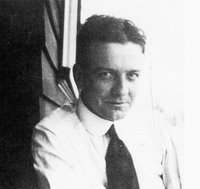 I guess I never expected Raymond Chandler's writing to live up to the stereotype his writing is now associated with. You know what I'm talking about - the hilarious use of similes and metaphors, the broads with long legs, the utterly disaffected protagonist, Philip Marlowe. But in fact that's exactly how Mr. Chandler writes. Consider these passages:
I guess I never expected Raymond Chandler's writing to live up to the stereotype his writing is now associated with. You know what I'm talking about - the hilarious use of similes and metaphors, the broads with long legs, the utterly disaffected protagonist, Philip Marlowe. But in fact that's exactly how Mr. Chandler writes. Consider these passages: The main hallway of the Sternwood place was two stories high. Over the entrance doors, which would have let in a troop of Indian elephants, there was a broad stained-glass panel showing a knight in dark armor rescuing a lady who was tied to a tree and didn't have any clothes on but some very long and convenient hair. The knight had pushed the vizor of his helmet back to be sociable, and he was fiddling with the knots on the ropes that tied the lady to the tree and not getting anywhere. I stood there and thought that if I lived in the house, I would sooner or later have to climb up there and help him. He didn't seem to be really trying.And then further on you get the stereotypical misogyny which is rampant throughout the book.
Actually misanthropic is a better description of Chandler's Philip Marlowe. He's an equal opportunity hater. If you've read James Ellroy (author of L.A. Confidential) it's hard not to see who he is emulating. Same locale, same set of twisted characters, same set of sordid happenings. Even so, I find both authors irresistible."Then you'd like him for the spot."
A little blank again. I was going too fast for her. It was hard not to... ...She giggled. Very cute. The giggles got louder and ran around the corners of the room like rats behind the wainscoting. She started to go hysterical. I slid off the desk and stepped up close to her and gave her a smack on the side of the face. The giggles stopped dead, but she didn't mind the slap any more than last night. Probably all her boyfriends got around to slapping her sooner or later. I could understand how they might.

No comments:
Post a Comment